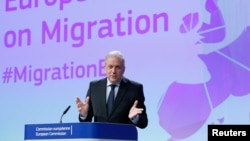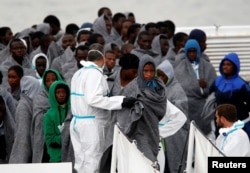European Union member states should be ready to detain more migrants who have no case for asylum to prevent them from running away before they are deported, the chief migration official with the bloc's executive arm in Brussels said.
The European Union is pushing to reduce immigration after 1.6 million refugees and migrants reached its shores via the Mediterranean in 2014-16. It wants to prevent people from coming and deport more.
“Return rates have to be improved,” Migration Commissioner Dimitris Avramopoulos said Thursday in presenting new, nonbinding proposals by the executive European Commission.
“Member states should also use the possibility to place migrants in detention if there is a risk of absconding and for a sufficient period to be able to complete the return and readmission procedure,” he said.
Brussels estimates there may be around 1 million people in the EU who should be sent back but that only about a third of those slated for return are actually being returned.
Detention for minors?
While EU law sets out the minimum common standards for returns, some member states had stricter domestic rules that could be eased to streamline the process, the commission said.
It recommended shortening appeals deadlines, issuing return decisions with no expiration date and considering more detentions, including for minors, which is barred now by some member states.
It said EU states should be less coy about detaining people for the maximum allowed pre-deportation time limit of 18 months if that was needed to ensure an effective deportation.
’Dignified conditions’
“It should never be considered something like a concentration camp,” Avramopoulos said, fending off criticism by rights groups that detaining asylum seekers or migrants was inadvisable. “The ones who are not entitled to refugee status, they have to be returned. But in meantime they have to stay somewhere — in very dignified conditions — in order to avoid absconding.”
It said detention should not be ruled out for minors, which is currently a red line in some EU states.
Beyond deportation, the commission also proposed setting up by midyear a program for assisted voluntary returns from Europe. It is already stepping up funding for the U.N. migration agency IOM to increase returns from Libya, now the main embarkation point for Europe.
That is part of a broader plan to work with the internationally recognized government in Tripoli to cut the number of people getting on smugglers' boats to head to Europe, even though the EU recognizes any cooperation with the lawless Libya can only bring limited results.
The bloc remains bitterly divided over what to do with those who are already in.
Poland, Hungry don’t take refugees
The commission said only 13,546 people had been moved from Greece and Italy — the two biggest arrival countries in the EU — to other member states under a two-year plan that was supposed to cover 160,000 people and expires in September.
It is a major point of contention among front-line Greece and Italy, Germany and Sweden — the eventual hosts for most refugees — and Poland and Hungary, which refuse to take in any.
Brussels has long threatened sanctions and, although the commission's head Jean-Claude Juncker said Thursday that he would use “all the tools ... to ensure that the commitments made are honored,” Avramopoulos also said that “we are not there yet.”







